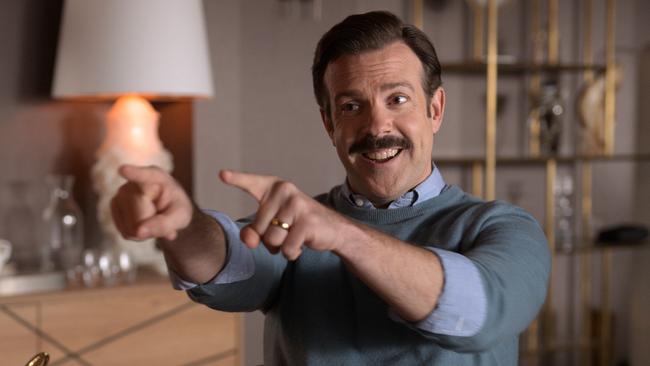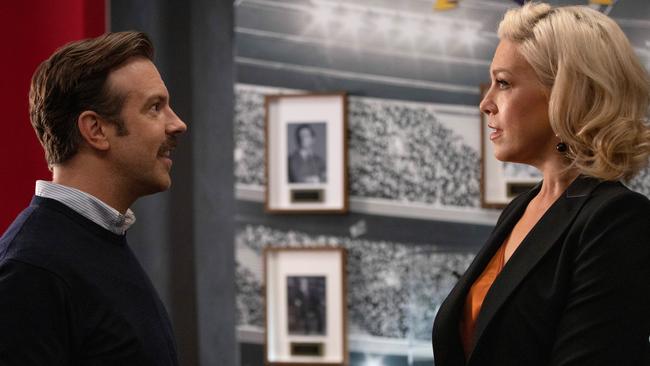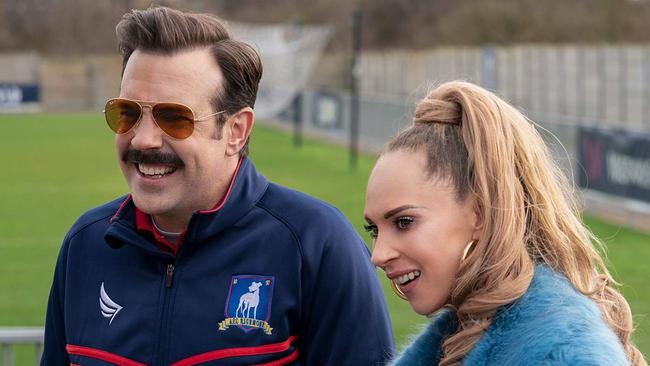‘Powerful white man’ cliche lassoed by reality

I’m glad I got to the end of season two. But I almost didn’t, thanks to a snippy review I came across in a pause between seasons by The New Yorker’s television critic, Doreen St Felix, who describes – or rather maligns – the main character as “quite the powerful white man”. There were a lot of players of colour on the team’s roster. Would Lasso, I wondered, reveal a white supremacist streak? Was he a master of the universe in red sneakers and chinos who would soon revert to his Wall Street ways?
I persisted, and I’m glad I did, because I soon realised that not only was this description mischievous and inaccurate, but it appears to flirt with sexism and racism. The melding of whiteness and masculinity into the trope of the “powerful white man” automatically invokes, by suggestion, its antitheses: the powerless black man or woman, along with the stock character of the colonial white oppressor.
St Felix, who is Haitian-American, seems not to have noticed that one of the show’s strongest plot lines follows the trajectory of Anglo-Indian kitman Nathan Shelley, who is promoted by Lasso to assistant coach. Lasso, in fact, is for much of the show a floundering, powerless white man whose greatest talent is his ability to endure ritual humiliation.
How could the TV critic for The New Yorker, which remains the gold standard for the kind of cultural criticism and reportage I care most about, reveal herself to be so tin-eared? How did she fail to get the joke, which is that the show is defined and animated by its interest in powerful women and powerful young sportsmen from the English working classes and the developing world? It’s not, despite its title, really about Ted Lasso at all. And that’s the subtle point.
An alert viewer will notice that while the young players on his roster come and go from training in a fleet of expensive sports cars, Lasso scuttles to and from work on foot. It’s the players who enjoy the material benefits of success.

In fact, the most powerful, and memorable, characters are three women. The club’s owner, Rebecca Welton, played by Hannah Waddingham, is the most complex and interesting of the trio. Her appointment of Lasso as head coach shocks the British sporting establishment because he is a Texan rube who knows as much about the code as he does about English culture – in the first episode he has to be restrained from walking in front of traffic. But that’s only part of the reason. There’s been no interview process or empanelling. It’s her decision alone. It comes as a complete surprise.
As much as her presence as the boss with a fondness for homemade biscuits is central to the show, the story of her own sexual power and autonomy gives it a distinctively contemporary touch.
At first it’s a latent quality, defined in the very first frames by a camera that lingers on her physique, and a wardrobe department intent on showing it at its best. She’s a goddess down on her luck. She has just walked out on her philandering husband, and the tabloids seem determined to torment her.
As the show rolls on, and her hapless love life turns a corner, she is defined very much as the ideal of a woman in control of her own sexual and romantic needs, courtesy of a dating app developed by the chipper Londoner Keeley Jones (Juno Temple), a former model who is now the club’s head of marketing.

The two women come from opposite ends of the British class system but their working relationship evolves into a close friendship. One of the strengths of the writing is the way it gives Jones the lines to establish herself as a woman at once highly sexualised, well grounded and an emblem of a “powerful woman on the rise”. One of her best lines hints at a bisexual past. “If I’m gonna dip my toe back into the lady pool,” she says to Rebecca, “I can’t think of a finer body of water to do it in than you.”
The third member of the trio is Dr Sharon Fieldstone, played by Sarah Niles, the most conspicuously and earnestly intelligent – and consequently least humorous – character in the show.
The real genius of Ted Lasso is the way that, despite its comic absurdities and its often relentless good humour, it manages to create a recognisable world. There’s a strong tendency among contemporary people to view society through the prisms, or pieties, of sexism and racism. There is a temptation to see these ills as structurally fixed, or systemic.
In fact, the reality of living in a liberal Western democracy is a lot like the world of Ted Lasso. It’s a world where women enjoy a great deal of opportunity, and upward social mobility, and sexual agency; and where our cultural industries are increasingly sensitised to the voices, and the aspirations, of minority religions and ethnicities. It may not be perfect. There’s a lot more to be done. But there are many reasons to be, along with Ted Lasso, cheerful.
Luke Slattery is a Launceston-based writer and journalist.






Over the summer I watched both seasons of Ted Lasso, a delightfully endearing comedy about a small-time American football coach recruited to helm a failing London soccer team. Lasso, played by Jason Sudeikis, has been hired by the fictional London club Richmond AFC’s female owner, who is going through a bitter divorce with her soccer-mad husband, who is the former club owner. Her hope is that Lasso will drive the ailing club into the ground. She wants revenge. How could he not fail?